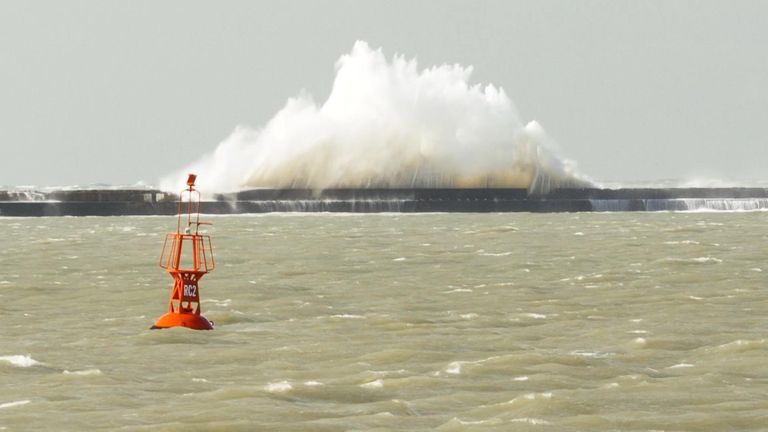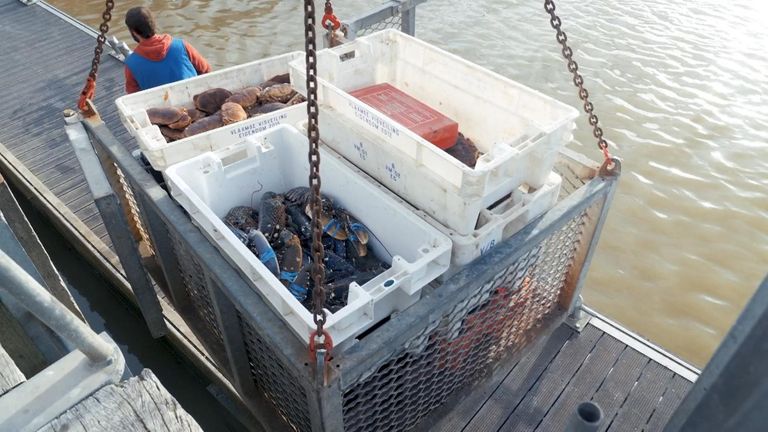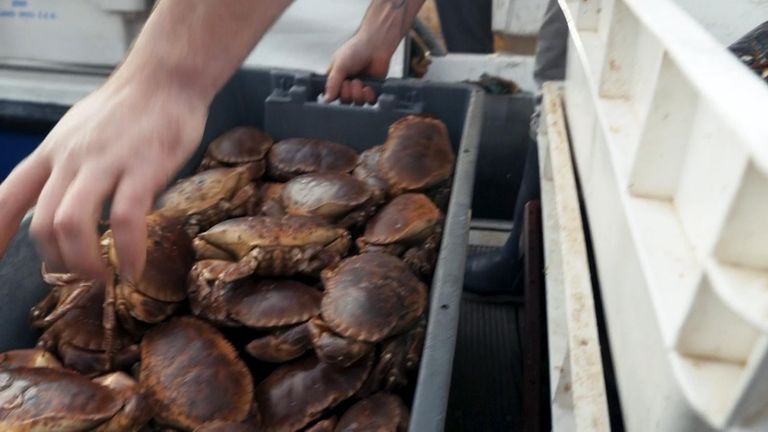In Boulogne, the waves are pounding into the sea wall with an intimidating ferocity. France’s busiest fishing port is a place that has long been accustomed to the whims of nature, but it is political uncertainty that troubles them here now.
For generations, boats have left this port to fish in the waters between France and England. Look across the water from Boulogne on a clear day and you can see Dover.
Today, as I look beyond the battered sea wall, I can make out the white cliffs in the far distance.
Viewed from here, the Channel has always seemed like a pretty generous bit of water for these fishermen. But now, as the waves become bigger, so the Channel looks more ferocious and unwelcoming.
It is just two and a half months until the end of the year, and the close of Britain’s transition period. If a Brexit trade deal has not been agreed by that point, Boulogne’s fishermen may face a truly profound change to their lives.
Even if there is a deal, access to British coastal waters may be curtailed. If the UK leaves without an agreement, then the impact would probably be felt much more severely.
Various fishermen in this town told me that they thought their businesses would no longer be viable; that careers would be brought to an end.
The flip side to this, of course, is the UK taking back control of its coastal waters, a theme that has resonated from the very start of the Brexit process. For some, that sort of idea is the very synthesis of the concept of sovereignty.
There is a reason why fishing has become so central to Brexit negotiations. The waters around Britain teem with seafood.
Some of it, like cod, is beloved by the British. Others, like the abundant sea snails or herring, are popular in France but barely tasted in Britain.
It leads to curious imbalances – the vast majority of cod from the Channel is caught by French boats, with some of it then sold back to the Brits. The flip side, is that the UK’s fishermen sell plenty of their haul to continental consumers.
At the moment, all of that is not just legal, but normal. But come 1 January, and new rules will be in place.
It is just that, so far, we do not know what those rules will be.
I spoke to many fishermen in this town, and did not find one who was confident that a Brexit deal would be done by the end of the year. There was nervousness, and among the fishermen I spoke to, a distinct lack of bravado.
When I was last in Boulogne, a few months ago, there was an air of machismo, talk of staging a blockade or simply ignoring any new restrictions. Now that mood seems to have gone.
We meet Gaetan Deslart, unloading his full haul of crabs. He has spent his life going in and out of British waters but says he would not risk breaking new regulations.
He said: “The sanctions will be so big and dangerous that we’re not going to take the risk of losing our boats by going into Brit waters or having enormous fines.”
“If it’s not allowed, we’ll respect it and we’ll come back to French waters. But if we have to do that, and all share these waters, we’ll be dead in the year.”
The EU wants to keep something like the status quo, with very irregular bouts of renegotiation. The UK wants to impose far greater restrictions, and annual quotas. The two sides remain a long, long way apart.
From an economic perspective, fishing is fairly trivial – a financial pin-prick compared to financial services or car-making. But it is symbolic to many of the concept of sovereignty. And when I say many, I do not just mean the British.
French President Emmanuel Macron is loath to sign up to any deal that curtails the reach of his fishing fleet.
The fishing lobby is politically powerful and, still wary of the Gilets Jaunes protests that have marked his presidency, he wants to show his support for French workers. What better way than to flex his muscles over fishing?
There are seven other nations in the European Union whose boats range into British waters – Belgium, the Netherlands, Ireland, Sweden, Denmark, Germany and Spain.
Most would not block a Brexit deal solely on the basis of fishing rights. France would consider it, though. And today, we discovered that the Spanish government will also come under pressure from their workers.
Jose Basilio Otero, President of Federation of Fishermen’s Guilds in Spain, told me that he was worried about the future of Spanish fisherman, boats and fish stocks.
His hope is, like many across Europe, for things to just carry on as they are.
“What we want is easy – that is to continue as we have been up to now”, he said.
“We need English waters and England needs to export the fish to Europe, so we should make a policy of not hurting ourselves and continue with the status quo that we have right now.”
But if he does not have it, he and his members will appeal to the government “to put a veto” on any deal that ends their access to their traditional fishing grounds.
In France, Spain and in the Netherlands, I spoke to fishermen and heard the same things – a frustration with the political process, a lack of resentment towards British fishermen, and, to quote one of Brexit’s greatest hits, a sense that no-deal would be better than a bad deal.
Where does this leave Brexit? With a problem.
For a long time, talks about fishing have been like the seagull I watched flying through the howling Boulogne wind – lots of effort, but almost no progress.
:: Subscribe to the Daily podcast on Apple Podcasts, Google Podcasts, Spotify, Spreaker
Now, time is running out. A deal will not be achieved this week, and probably not even this month.
But if it is to be in place by the end of the year, then compromise, acceptable to Boris Johnson, Emmanuel Macron, various other leaders, the European Council and the European Parliament, will have to come. And it will have to come soon.
Possible? Yes. Easy? No.




